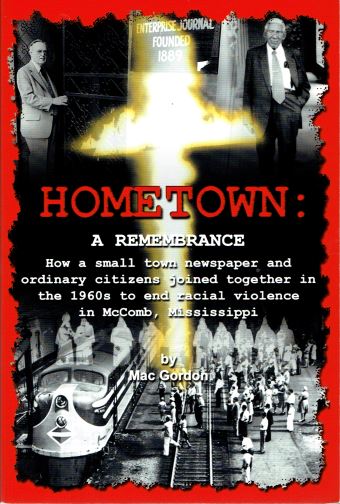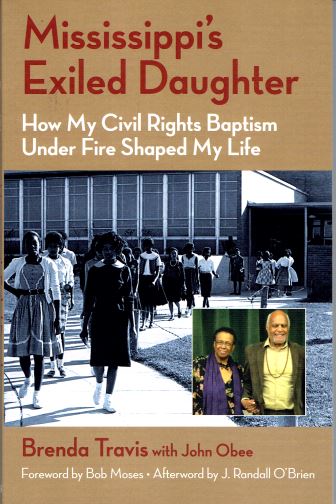We are the sum of all of our history and all of our progress.
by Deborah Fagan Carpenter
We are informed by our past, but we are not all stuck there. Time stands still; time produces evolution. Some things change; some things don’t. There is progression of thought; there is a mindset that is dug-in to the past. There is widespread acceptance; there is widespread racism. There is overwhelming beauty, and there is heart-wrenching sorrow and ugliness. Similarity and contradiction stand side by side. Sometimes it requires understanding, and sometimes it deserves celebration. We are the sum of all of our history and all of our progress. We are today’s South.
Nowhere are the words from the home page of the Porchscene blog truer than the examples shared in books by natives of McComb, Mississippi, Mac Gordon and Brenda Travis. Whether we like it or not, “we ARE the sum of all of our history and all of our progress.”
During the tumultuous Civil Rights Movement in the early 1960s, both history and progress were made in the south Mississippi town of McComb, which, along with Mac and Brenda, is my own hometown. McComb and the surrounding area was a hotbed of violence perpetrated by the KKK and white supremacists in opposition to racial equality, specifically over voter equality and other fundamental human rights. The progress that was made was gained through the courageous acts of some people whose lives were forever altered in payment for their efforts.

The son of a newspaper journalist, Mac Gordon had a front row seat for the events that transpired in Pike, Amite, and Walthall counties from 1961 through 1964, which he describes in his 2013 book, Hometown: A Remembrance. Gordon recounts the story of the brave townspeople who finally came forward to help end the violence amidst cross burnings, church, home, and business bombings, and a general reign of terror.
Mac Gordon also relates the appalling story of one prominent McComb family, the Heffners, who was virtually forced to leave the city out of fear from threats and harassment as a result of their simple act of inviting two civil rights workers into their home to try to arrive at some resolution to the upheaval. (A book by Hodding Carter II, So the Heffners Left McComb is also recommended reading on this subject.) The Heffner’s oldest daughter, Jan Nave was Miss Mississippi at the time of the family’s forced departure.
Gordon’s book gives readers the vivid details of the unfortunate events of the early 60s in McComb, as witnessed first-hand and through accounts from his journalist father and other reporters at the McComb newspaper, the Enterprise Journal. The disturbing facts of those times are accurately reported in Hometown: A Remembrance.

One of the most tragic consequences of the Civil Rights Movement in McComb was the story of a teenaged African-American female who tried to make a difference by engaging in peaceful protests. Brenda Travis, who at ten years old, was so stricken by the brutal murder of Emmet Till and the middle-of-the-night false arrest of her brother, made a decision at that early age, that when the opportunity presented itself, she would do something to try to make a positive change.
When in 1961, she and four young men bought a ticket at the white counter in the Greyhound bus terminal and then sat down at the lunch counter to be served, they were charged with “trespassing,” arrested, and incarcerated for 28 days in the county jail. When she was released, having missed the first month of the school year, Brenda went to her school to register, where she was informed by the principal that the school board insisted she be expelled. So enraged were her fellow students at this outcome that she and over a hundred of her classmates marched from the school to the steps of the McComb City Hall, where they were beaten as they ascended the steps and then arrested. Brenda Travis was sentenced to a year at a reform school for this peaceful protest but was released before the end of the full year under the condition that she leave the state of Mississippi within twenty-four hours, never to return.
In 2006, Brenda did return to McComb for the forty-fifth anniversary of the 1961 direct action against segregation. Dr. Randall O’Brien, current President of Carson-Newman University, then the Executive Vice President and Provost of Baylor University, drove from Texas to attend the ceremony, where he presented Brenda with the Bronze Star that he had been awarded in Viet Nam. After giving her the generous gift, he said to her, “A few years after our civil rights battles for our country, I fought for our country on a different battlefield — in Vietnam. Sometimes in an imperfect world, a person might need to fight for his country. But no one— no one —should ever have to fight her country!” The full story of Randall’s presentation of his cherished award to Brenda can be read in his Porchscene article, “A Bronze Star for Brenda.”
Brenda Travis is a heroine who sacrificed a normal life — as did many others — to right injustices through selfless, non-violent actions. Her enthralling story is told in her newly released book, Mississippi’s Exiled Daughter.
I found it impossible to read both Mac Gordon’s Hometown: A Remembrance and Brenda Travis’s Mississippi’s Exiled Daughter without experiencing a good deal of self-examination and soul-searching. Schools throughout the country — not just in my home state of Mississippi — would probably benefit greatly by making both of these books required reading. The books reveal both our history and our progress and they’re both absolutely thought-provoking.
Hometown: A Remembrance is available at www.amazon.com and through the Magnolia, Mississippi Gazette
Mississippi’s Exiled Daughter is available at www.amazon.com
So the Heffners Left McComb is available at www.amazon.com
Link to Dr. Randall O’Brien’s article, A Bronze Star For Brenda http://porchscene.com/2017/10/17/a-bronze-star-for-brenda/
(On the tenth anniversary of Katrina, Carla Heffner, now Carla Carlisle, graciously allowed Porchscene to republish her article, Our Spiritual Watering Hole, which originally appeared in her weekly column in the English magazine, Country Life.)
Link to Carla Carlisle’s article, Our Spiritual Watering Hole http://porchscene.com/2017/08/29/our-spiritual-watering-hole-carla-carlisle/



A great article Deborah. I’m blessed to count you and Randall as friends. I lived a couple of houses down from the Heffners and remember much of that unfortunate incident. I read their book too. Looking forward to reading the books by Mac and Brenda. And there are rumors that Randall is working on a book. Hint hint Randall.
Thanks again Deborah!
Thanks, Don. He and I are your somewhat left-leaning friends. 🙃
this is a very moving article Deborah. I am always dumbfounded by the un-Christ-like things that some professed Christians are capable of doing.
Thank you, Deborah, for your review of these great books and persons. History reminds us we’re all riding that train, embarking and exiting at different times, but all aboard and connected.
Yes, it is, indeed, a soul train.
Thank YOU, Randall for your many years of battling inequallity.